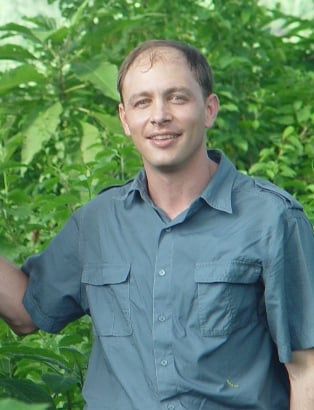Posted on September 13, 2011

Prof McKechnie obtained his PhD in 2002 from the University of Natal, after which he completed a postdoctoral fellowship at the University of New Mexico. His research examines the ecological and evolutionary physiology of birds and mammals, and seeks to better understand the ways in which physiology determines ecological and evolutionary processes. A current focus area in his research group is the use of physiological data and modelling to predict the consequences of climate change for species inhabiting hot, arid environments. His research output includes 40 peer-reviewed publications, 61 conference presentations and 45 articles in semi-popular magazines. He currently holds a P-rating from the National Research Foundation. Recent awards include a UP Exceptional Young Researcher Award and the Friedel Sellschop Award from the University of the Witwatersrand.
Prof Slippers was recently honoured with the 2011 AU TWAS Young Scientists' National Award and also received the British Association Medal (Silver) from the Southern Africa Association for the Advancement of Science (S2A3). Another feather in his cap was when the Global Young Academy, elected Prof Slippers as the Co-chair. His research interests are in ecological and evolutionary genetics of fungal pathogens and insect pests of trees, and their biological control agents (including the development of biological control programmes). A special further interest is in the various levels of interactions between fungi and insects. He also enjoys doing fungal taxonomy and he has focused on the Botryosphaeriaceae. He is a research leader in the Tree Protection Co-operative Programme and the DST NRF Centre of Excellence in Tree Health Biotechnology.
In South Africa, a young academy will contribute to the achievement of the national strategic priority of strengthening the skills and human resource base of the country and enhancing international cooperation. It will contribute to the achievement of the DST grand challenge, human and social dynamics, through its goal to develop scientific human capital for the country.
SAYAS will, among others strive to contribute to the career development of young and emerging scientists; provide mentoring and role modelling services to learners and the youth, promote science awareness among learners, youth and society in general, and link South African young scientists to those in the rest of Africa and globally. Other goals include linking young scientists with the business community, providing policy advisory services to government and society on science issues affecting young scientists; collaborate with the established Academy of Science of South Africa (ASSAf) on projects and activities related to the development of young scientists, as well as preparing young scientists for membership into national and international science organisations.
Ms Naledi Pandor, Minister of Science and Technology will officially launch SAYAS and inaugurate the Founding Members on 27 September 2011
Copyright © University of Pretoria 2025. All rights reserved.
Get Social With Us
Download the UP Mobile App